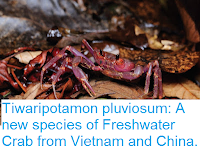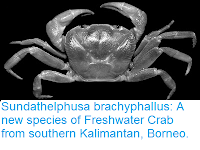Mud Lobsters, Thalassina pratas, are large, Shrimp-like Decapod Crustaceans found in Mangrove forests from Southern India east to the Ryukyu Islands and southeast to Australia, Fiji and Samoa. The largest species can reach 30 m in length, but most species have an adult size of 6-20 cm. Mud Lobsters often dig extensive burrow systems, and are considered to be a serious pest around Fish and Prawn farms, though this burrowing is considered to play an important role in the recycling of nutrients in Mangrove ecosystems and many other animals are associated with the burrow systems.
In a paper published in the Raffles Bulletin of Zoology on 20 May 2016, Feng-Jiau Lin of the Tainan Hydraulics Laboratory at the National Cheng Kung University, Tomoyuki Komai of the Natural History Museum and Institute in Chiba, and Tin-Yam Chan of the Institute of Marine Biology and Center of Excellence for the Oceans at the National Taiwan Ocean University describe a new species of Mud Lobster from Dongsha Island in the South China Sea.
The new species is named Thalassina pratas, 'Pratas' being an alternative name for Dongsha Island, and also meaning a Grass lawn or meadow in Latin; the species is unusual in that it was found in subtidal Seagrass beds, 1-2 m below the surface, rather than tidal Mangrove forests. The species is described from a single female specimen, 144.4 mm in length and orange-brown in colour with a whitish underside.
Thalassina pratas, live animal in habitat when collected. Lin et al. (2016).
See also...







